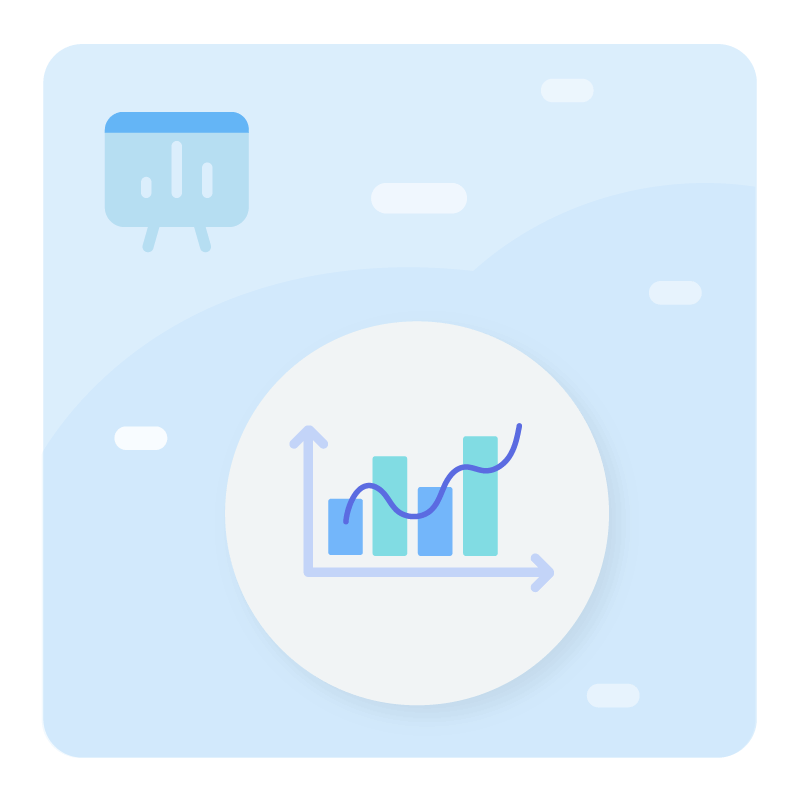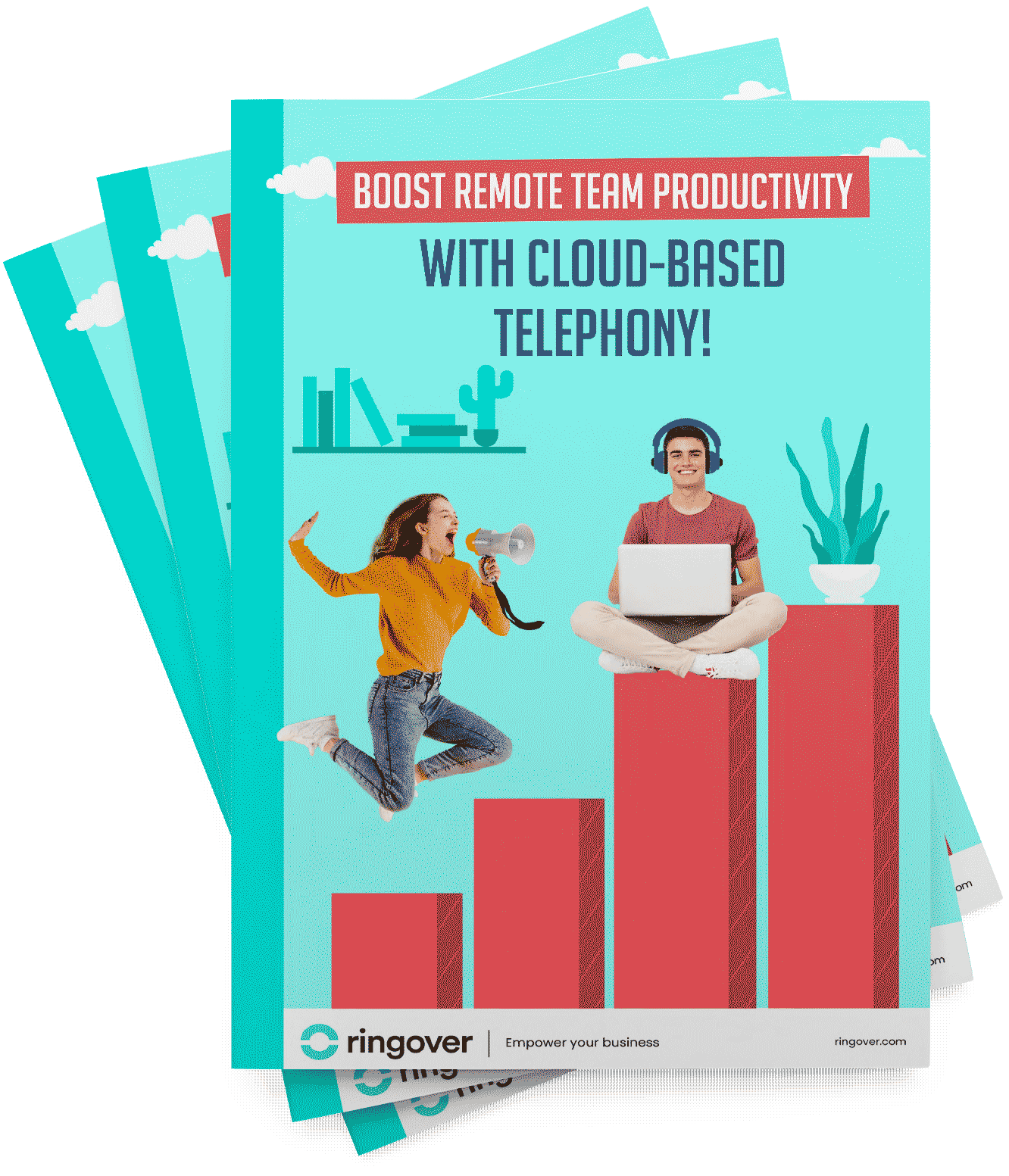Summary
- Progressive Dialer vs Power Dialer: Key Differences
- What is a Progressive Dialer?
- What is a Power Dialer?
- Deeper Dive: Choosing Your Dialer
- How to Choose the Right Dialer
- When to Use a Progressive Dialer
- When to Use a Power Dialer
- Choosing the Right Dialer for Your Business
- Don't Forget About Integrations with Your Dialer
- Maximizing Results with Either Dialer Type
- Your Dialer Implementation Checklist:
- Pre-Call Strategy Template (for Power Dialer Users)
- Empower By Ringover Advantages
- Citations
When businesses build an outbound dialer sales operation, selecting the correct dialling technology significantly influences team productivity and efficiency. This is an important decision for sales leaders, who aim to optimize interactions. Two popular options—progressive dialers and power dialers—are often discussed together, but they serve distinct purposes within a sales stack.
A core distinction is that a progressive dialer automatically dials numbers for agents. It includes built-in screening capabilities, ensuring that the team connects only with live prospects. A power dialer, conversely, immediately connects agents to all calls without preliminary screening. Both technologies are effective at eliminating manual dialing. However, they approach agent workflow and call management in different ways.
Understanding these nuances is crucial. An inappropriate choice can either overwhelm agents with unqualified calls or, conversely, leave them idle while awaiting the next conversation. This article will explain how each system operates to help businesses determine the optimal fit for their specific sales requirements. As these systems are explored, you will see how outbound call center software solutions like those offered by Ringover can enhance either approach, helping teams in September 2025 navigate outbound sales processes.
Progressive Dialer vs Power Dialer: Key Differences
Understanding the core distinctions helps clarify which tool will best support team objectives.
| Feature | Progressive Dialer | Power Dialer |
|---|---|---|
| Call Screening | Filters calls before agent connection | Connects all calls directly to agents |
| Answering Machine Detection | Built-in filtering capabilities | Agent handles all voicemails manually |
| Agent Idle Time | Minimal, connects only to live prospects | Potentially higher due to voicemails and busy signals |
| Agent Control | System-managed call routing | Agent-controlled call handling and interaction |
| Best For | High-volume operations focused on live connections | Personalized sales requiring agent judgment |
| Learning Curve | Moderate setup and configuration required | Simple implementation and usage |
What is a Progressive Dialer?
A progressive dialer is a balanced solution in automated outbound calling. It is a system that systematically dials phone numbers from a pre-loaded list, connecting agents to calls only when a live person answers [2]. This approach prioritises the quality of connections over sheer volume.
The process typically unfolds as follows: Once an agent becomes available, the system automatically dials the next number on their contact list. Unlike simpler auto-dialers, a progressive dialer often incorporates answering machine detection and sophisticated call screening. This means that when a call is answered, the system quickly determines if it is a real person or an automated message before routing the call to the agent [1]. This intelligence is intended to reduce agent idle time for sales teams.
Key Features of Progressive Dialers
Progressive dialers are designed to optimize agent talk time with genuine prospects, and they typically include these core capabilities:
- Automatic number dialing from curated contact lists.
- Answering machine detection to efficiently filter out voicemails, optimizing agent effort.
- Call screening capabilities to identify and prioritize live prospects.
- Agent availability monitoring to ensure a smooth flow and prevent unnecessary call queuing.
- CRM integration for seamless contact management and data logging.
- Real-time analytics and reporting to track call outcomes and agent performance.
This type of system typically maintains a one-to-one ratio between agents and active calls, ensuring that each available agent receives exactly one live connection. This focus on live connections can contribute to increased agent efficiency and may lead to fewer dropped calls [2].
What is a Power Dialer?
In contrast, a power dialer is a sales technology tool designed for speed and agent control. It automatically dials telephone numbers from a contact list and immediately connects agents to all calls, whether they reach a live person, a voicemail, or even a busy signal [4]. It focuses on providing the agent with direct control over the interaction.
The system operates by placing the next call almost instantaneously as soon as the previous one concludes. When someone answers—be it a prospect, a voicemail system, or an unexpected tone—the agent handles the interaction directly. This approach provides sales representatives with autonomy over their conversations and subsequent actions, such as leaving personalized voicemails or making quick notes for follow-up. It is particularly suitable for B2B sales where personalized conversations are key [4].
Solutions like Ringover's power dialer offer features such as unlimited calling to over 110 destinations, advanced analytics, and global virtual numbers. This enables sales teams to maintain high productivity while facilitating personalized interactions.
Key Features of Power Dialers
Power dialers prioritize rapid outreach and agent autonomy. They typically focus on these essential functionalities:
- Automatic sequential dialing through extensive contact lists.
- Immediate call connection to agents for every dialed number.
- Click-to-call for quick follow-ups.
- Local presence dialing with local phone numbers, which can increase pickup rates.
- Voicemail drop functionality for pre-recorded messages, saving agents time.
- CRM synchronization for instant contact data access and updates, including with popular software like Salesforce, Hubspot, and more.
- Call logging and analytics for performance tracking and optimization.
This system aims to maximize call volume and provides agents with the flexibility required for nuanced sales interactions [3]. It is known for increasing call volume, boosting connect rates, and saving agents time, allowing them to focus effectively on their conversations [4].
Deeper Dive: Choosing Your Dialer
Choosing the right dialer is not just about features; it is about aligning technology with your team's workflow and sales strategy. Here is a quick comparison to help you narrow down your options:
| Option | Best For | Pros | Cons | Notes |
|---|---|---|---|---|
| Progressive Dialer | High-volume lead qualification, telemarketing, customer callbacks | Minimizes agent idle time by connecting only live calls; contributes to agent efficiency by reducing time on non-connects | Less agent control over individual calls; not always ideal for highly personalized, nuanced outreach; might feel restrictive for experienced representatives | The system automatically dials numbers and screens them, routing only live answers to agents. This can contribute to high efficiency for teams focused on maximizing talk time with actual prospects. |
| Power Dialer | B2B sales, account management, complex sales cycles, relationship building | Maximizes raw call volume; offers agents control to leave personalized voicemails or adapt interactions; suitable for tailored outreach | Agents may spend more time dealing with voicemails and busy signals, potentially leading to lower live connect rates compared to progressive dialers | An agent or the system dials rapidly, connecting all outcomes (live person, voicemail, busy signal) directly to the agent. This approach enables agents with flexibility for tailored conversations and follow-ups, which can be crucial for relationship-driven sales. |
How to Choose the Right Dialer
- Choose a Progressive Dialer if: Your primary goal is to ensure agents are consistently talking to live prospects, you handle high volumes of calls with standardized initial interactions, and you want to minimize time spent on non-connects.
- Choose a Power Dialer if: Your sales process demands significant agent autonomy, personalized outreach, handling complex B2B interactions, and the flexibility to adapt to various call outcomes (like leaving tailored voicemails).
- Consider your team's experience: Newer or high-volume teams might benefit from the structured efficiency of a progressive dialer, while seasoned representatives in complex sales often benefit more from the control a power dialer offers.
Ringover’s power dialer ensures you can efficiently and successfully execute call campaigns for the best return on your time.
When to Use a Progressive Dialer
Progressive dialers are particularly effective in scenarios where the quality of connection is paramount, rather than solely the raw number of calls placed.
- High-Volume Outbound Centres: When a team makes hundreds, or even thousands, of calls daily, and the primary goal is to maximize agent talk time with actual prospects, progressive dialers are effective. They can lead to increased agent efficiency by reducing wasted time x
- veagent.com/customer-support-glossary/progressive-dialer" target="_blank">x
- veagent.com/customer-support-glossary/progressive-dialer" target="_blank">[2]x
- veagent.com/customer-support-glossary/progressive-dialer" target="_blank">.
- Lead Qualification Operations: If the main objective is to connect with live prospects for initial qualification—rather than spending time leaving voicemails or managing complex follow-ups—this is a suitable tool.
- Telemarketing Campaigns: For campaigns requiring consistent live connections for product demonstrations or service explanations where real-time interaction is essential.
- Customer Support Callbacks: In outbound customer service, where speaking directly with customers is crucial for resolving issues, progressive dialers ensure a direct line.
This approach significantly reduces the time wasted on answering machines and helps ensure agents are not overwhelmed with simultaneous calls they cannot effectively handle.
When to Use a Power Dialer
Power dialers are advantageous in situations where agent control, personalisation, and the ability to adapt in real-time are paramount for driving results.
- B2B Sales Operations: When sales representatives need to leave personalized voicemails, navigate gatekeepers, or handle complex decision-making processes that require human judgment, a power dialer offers flexibility [5].
- Account Management: For outreach to existing customers where representatives need the flexibility to manage various call outcomes, schedule immediate follow-ups, or conduct more personal conversations.
- Complex Sales Cycles: In scenarios where deals require multiple touchpoints and agents need to adapt their approach based on the specific outcome of each call in real-time.
- Relationship Building: Especially important in industries where personal connections and developing trust are critical factors for closing deals.
Power dialers provide experienced sales professionals with the tools for connection while automating the tedious, manual work of dialing numbers, freeing them to focus on the conversation. This can lead to higher connect rates and improved focus for sales teams.
Choosing the Right Dialer for Your Business
The choice between a progressive and power dialer is not solely about technology; it is about aligning with specific sales processes and business objectives.
Consider Progressive Dialers If:
- You prioritize agent efficiency and live talk time over highly personalized, granular call control.
- Your sales process is built around high-volume lead qualification.
- Agents primarily handle similar calls with standardized scripts.
- You aim to minimize the time agents spend dealing with voicemails and busy signals.
Consider Power Dialers If:
- Your sales process relies on personalized, relationship-based interactions.
- Agents require flexibility to handle diverse call outcomes on their own terms.
- Voicemail outreach and strategic follow-up are important components of your strategy.
- You navigate complex B2B sales cycles that require human judgment.
Team Size and Experience Level
Team dynamics also play a role. Smaller, highly experienced sales teams often find greater value in power dialers because they can fully leverage the flexibility and control these systems provide. Larger teams, particularly those with newer representatives, may find progressive dialers more effective for maintaining consistent productivity and ensuring focus on live connections.
Don't Forget About Integrations with Your Dialer
Regardless of the dialer type selected, robust integration capabilities are important for maximizing effectiveness in today's technology-driven sales environment. Solutions like Ringover's auto-dialer solutions are designed to connect seamlessly with existing technology stacks.
Key integration requirements to consider include:
- CRM Synchronization: Automatic updates of contact data, call logging, and seamless creation of follow-up tasks. This is where Computer Telephony Integration (CTI) offers features like screen pops with customer data.
- Analytics Platforms: Real-time reporting and performance tracking to continually refine strategies.
- Communication Channels: Integration with SMS, email, and chat for a comprehensive omnichannel outreach strategy.
- Workflow Automation: Trigger-based follow-up sequences and automated task creation to maintain momentum.
The most effective dialing solutions also provide comprehensive analytics and reporting to help optimize outbound operations, irrespective of the dialer type ultimately chosen.
Maximizing Results with Either Dialer Type
Success with any dialing system depends on proper implementation and ongoing optimisation. It is not solely about the technology; it is about its effective utilisation.
- Contact List Quality: Both systems perform more effectively with clean, targeted contact databases that accurately match the ideal customer profile.
- Agent Training: Representatives require specific training on handling the unique workflows each dialer type creates.
- Performance Monitoring: Regular analysis of connection rates, conversion metrics, and agent productivity helps identify bottlenecks and optimize strategies.
- Compliance Management: Ensure that the chosen system includes built-in compliance features for relevant regulations, such as those enforced by the Information Commissioner's Office (ICO) in the UK for data protection and direct marketing, assisting with managing aspects like Do Not Call (DNC) lists.
Here are some actionable steps to get you started and a handy checklist to ensure you are on the right track.
Quick Steps: Implementing Your Dialer Strategy
- Define Your Sales Goals: Clearly outline whether your priority is high-volume live connections (progressive) or personalized, nuanced conversations (power).
- Evaluate Team Needs: Assess your team's size, experience level, and preferred workflow to match with the right dialer.
- Audit Your Data Quality: Ensure your contact lists are clean, targeted, and segmented for optimal performance, saving agents time.
- Integrate with Your CRM: Seamlessly connect your chosen dialer to your existing CRM for automated data synchronization and efficient workflow management.
- Train Your Agents Thoroughly: Provide comprehensive training specific to the dialer's features, new workflows, and best practices.
- Monitor & Optimize: Regularly review performance metrics, gather agent feedback, and adjust your strategy for continuous improvement.
Your Dialer Implementation Checklist:
- Sales goals clearly defined and documented for all stakeholders.
- Team experience and workflow preferences thoroughly assessed and aligned with dialer choice.
- Contact database cleaned, updated, and segmented for targeted outreach.
- CRM integration successfully configured and tested for data flow.
- Agent training completed, and ongoing support resources are readily available.
- Performance monitoring dashboards and reports are set up and actively reviewed.
- Compliance features (e.g., Do Not Call lists, local regulations) are active and understood.
Pre-Call Strategy Template (for Power Dialer Users)
When using a power dialer, your agents have more control over each interaction. Empower them with a quick pre-call strategy:
**Prospect Name:** [Insert Name]
**Company:** [Insert Company]
**Last Interaction:** [Date, Key Takeaway]
**Call Objective:** [e.g., Qualify lead, Book demo, Follow-up on proposal]
**Personalized Opening:** [Specific reference or question to build rapport]
**Key Questions to Ask:**
* [Question 1]
* [Question 2]
**Value Proposition to Highlight:** [Relevant benefit based on prospect's needs]
**Desired Next Step:** [e.g., Schedule a 15-min follow-up, Send specific resource]
Empower By Ringover Advantages
Whether you are looking for high-efficiency live connections or seeking to provide sales representatives with maximum control, Ringover offers an advanced business phone system and conversation intelligence tools sales teams can leverage. We understand what drives results in the competitive market and beyond.
With Empower by Ringover, our integrated conversational AI solution, teams gain access to cutting-edge tools. Did you know that 85% of sales teams using power dialer software have seen a 30% increase in call volumes and a 25% increase in conversion rates [6]? And AI-powered dialers have led to a 15% increase in sales efficiency and a 10% increase in customer satisfaction rates [6]? These insights highlight the power of integrating AI technology. Empower by Ringover includes AI transcription and analysis, advanced reporting, call summaries, call libraries, and more, all designed to convert more conversations into closed deals. Empower by Ringover integrates seamlessly with existing CRM tools and offers AI-driven call transcriptions and semantic analysis, enhancing call monitoring and providing deeper insights into customer interactions. This solution can help optimize sales strategies for improved outcomes.
The correct dialer technology is not merely a tool; it becomes a strategic advantage when it aligns perfectly with sales processes, team capabilities, and broader business objectives. It is about enabling agents to have more productive conversations with qualified prospects each day.
Explore Ringover's comprehensive solutions and discover the power of Empower by Ringover today to transform your sales team's performance. Start your Empower free trial today!
Citations
[1]https://knowlarity.com/blog/progressive-versus-predictive-dialer
[2]https://liveagent.com/customer-support-glossary/progressive-dialer
[3]https://brightpattern.com/what-is-power-dialer-vs-auto-dialer
[4]https://revenue.io/inside-sales-glossary/what-is-a-power-dialer
[5]https://klenty.com/blog/what-is-a-power-dialer
[6]https://superagi.com/top-10-sales-dialer-software-tools-of-2025-a-comprehensive-review-and-comparison
Published on September 24, 2025.



